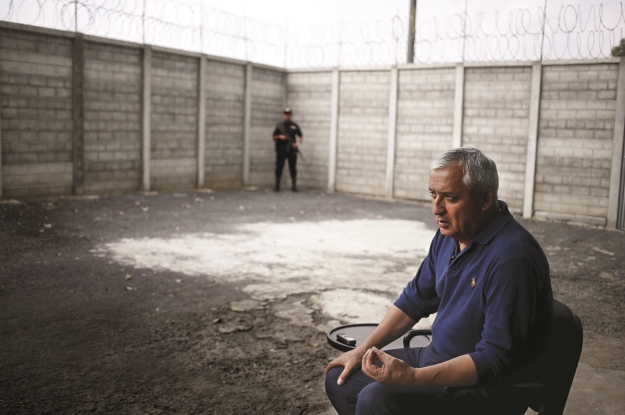This article is adapted from our 1st print issue of 2016. For a look at our Top 5 Corruption Busters special feature, click here.
Guatemala? Really?
I confess — that was my reaction when Guatemala went further than any other country in the anticorruption crackdown now sweeping Latin America.
It’s one thing for Brazil or Chile, with a longer history of strong institutions, to investigate the powerful and put them in jail. But Guatemala? A country that just 20 years ago was in the throes of civil war? A country so besieged today by drug violence and poverty that people send their children north, often alone, to escape?
This was the country that gathered hard evidence of graft against a popular sitting president, stripped him of his immunity from prosecution, induced him to resign amid massive street protests, and then put him in jail the very next day? All without a single shot being fired?
Really?
When AQ traveled to Guatemala recently to learn more about how this happened, many locals said they were just as surprised. In fact, the shock was most palpable among the very people responsible for putting former President Otto Pérez Molina in prison in September. “No, I wasn’t sure this could happen here,” Thelma Aldana, Guatemala’s attorney general, told me. She credited a long list of factors, and concluded, “I suppose you could say the stars aligned.”
Well, maybe. But after interviewing nearly two dozen people involved in the Pérez Molina case, I was struck by the incredible similarities with what’s happening in other countries. I spent the last five years living in Brazil, watching in awe as the probe of corruption at state-run oil company Petrobras unfolded, sending many of the country’s elite business leaders and politicians to prison. Well, it turns out that the trends favoring Aldana’s investigation in Guatemala were almost exactly the same ones supporting Judge Sérgio Moro’s work on the Petrobras case, some 4,000 miles away.
Indeed, Guatemala is proof that something truly historic is happening in Latin America today. Corruption has always been part of life, and it has always upset people, perpetuating the inequality that is both the region’s hallmark and its greatest curse. But a number of profound changes have swept Latin America over the last 10 to 20 years. These changes are occurring even in the hemisphere’s most fragile countries, ushering Pérez Molina and many others like him out the door – and, often, to prison. As the following story shows, if it could happen here, it can happen anywhere.
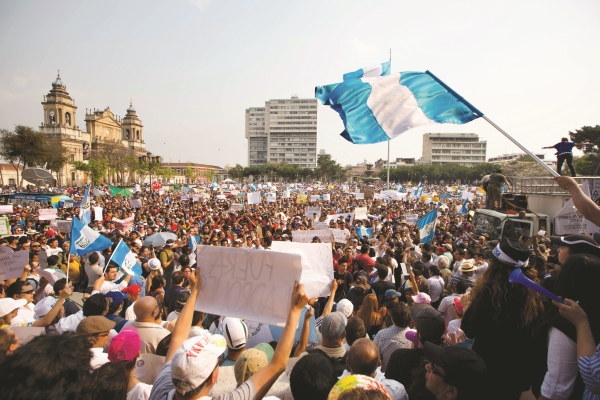 The historic first protest, on April 25, 2015. (Moises Castillo/AP)
The historic first protest, on April 25, 2015. (Moises Castillo/AP)
1. The Facebook Effect
Gabriel Wer, 33, never had much interest in politics. Guatemala, like other Latin American countries, was the kind of place where you kept your head down. But on the evening of April 17, 2015, he stepped away from his family business and sat down at a computer to vent his rage.
In his short lifetime, Wer had seen civil war, the extra- judicial murders of thousands of his countrymen, and the failure of ensuing governments to hold the killers accountable. He had seen economic stagnation, and the penetration of the Guatemalan state by drug traffickers. But what pushed Wer to the brink that Friday evening? A new corruption scandal, in which Vice President Roxana Baldetti and other officials were accused of skimming millions of dollars via a scam involving the customs agency.
“I thought it was ridiculous, that someone could steal so much and not have to answer for it,” Wer told me. Baldetti, who first entered the national spotlight in 1980 as a runner-up for Miss Guatemala, was already notorious for making brutally insensitive comments in front of cameras. Pretty, tone-deaf and vain, she was a villain ready-made for the Facebook Age. After a BBC report revealed vile conditions at a Guatemalan mental hospital, including the systematic sedation and rape of patients, Baldetti told a reporter the hospital was “very pretty” and blamed the patients for the mess. On a press tour of a grossly polluted lake outside Guatemala City, she declared, “It doesn’t stink at all” and offered to go swimming.
These videos circulated widely on Facebook and WhatsApp in a country where 75 percent of the population live in poverty, but more than 85 percent of adults own a mobile phone. Corruption not only angered people, it united them — in a way that the great causes of the 20th century never could. As Samuel Pérez Álvarez, a university student leader, told me: “My friends hate anything divisive, anything ideological. But corruption affects everybody, right and left, because everyone pays taxes. Cases like (Baldetti’s) bring people together, which is great.”
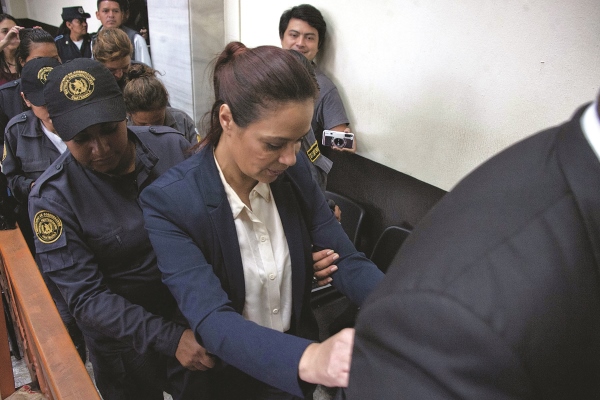 Former Vice President Roxana Baldetti leaves court after an August 2015 corruption hearing. (Johan Ordonez/AFP/Getty)
Former Vice President Roxana Baldetti leaves court after an August 2015 corruption hearing. (Johan Ordonez/AFP/Getty)
That’s true, but someone had to send the invitation first. And on that fateful Friday evening, as Wer angrily scrolled through Facebook, he spotted a post from a family friend. It was an “event page” calling for a protest against Baldetti the following Saturday, in the Plaza de la Constitución, Guatemala’s biggest public space. Wer was intrigued, but the page lacked pictures or a catchy slogan. He messaged his friend, asking if he could touch it up. “It’s yours,” the friend replied.
Soon the page had a brighter look and a new title —“Peaceful Protest Resign Now Roxana Baldetti and Otto Pérez Molina.” Wer added a note emphasizing the “peaceful” part, and making clear the protest was not affiliated with any political party. “I was hoping for maybe 200 people,” he recalled, laughing.
“Within an hour or so, 100 people had signed up, and I was proud. Soon it was 1,000, and I wondered, ‘What’s going on?’ Then, the media started to pick it up. By the end of the night, we had 10,000.
“It was clear people had been waiting for something like this.”
2. Fear Is Gone, Replaced by Democracy
The following Saturday, as Wer approached the plaza, he heard the protest before he saw it. Drums, whistles and chanting filled the air. As he turned the corner, he saw the crowd — more than 1,000 people already, with signs saying “No to corruption!” and “You can’t buy milk because taxes are so high!” The final turnout before the day ended: between 20,000 and 30,000 people.
The most amazing part, many later agreed, was the diversity of the crowd: young and old, rich and poor, indigenous and ladino. Anybody with a grievance against the government was there. “In Guatemala, we’re normally very isolated from each other,” said Jose Forester, an accountant who was there that day. “Normally, the rich are with the rich, and the poor are with the poor. April 25 was a new experience.”
It’s hard to overstate this point: Nothing similar had ever happened in Guatemala before. The last big wave of protests had occurred in the 1980s, but they were largely the realm of leftist students and union activists — and dangerous as hell. Nineth Montenegro, now a congresswoman, was part of that generation. “We held our protests in the same plaza,” she told me, “and the soldiers would come out and cut us down with machine guns. They didn’t care.” Montenegro’s first husband, a fellow activist, was abducted by state security forces in 1984 and never seen again.
When Montenegro saw these new protesters in the Plaza de la Constitución on April 25, her first reaction was utter terror. “I saw people had even brought their children, and I thought they were crazy,” she said. “I wanted to tell them ‘Run!’”
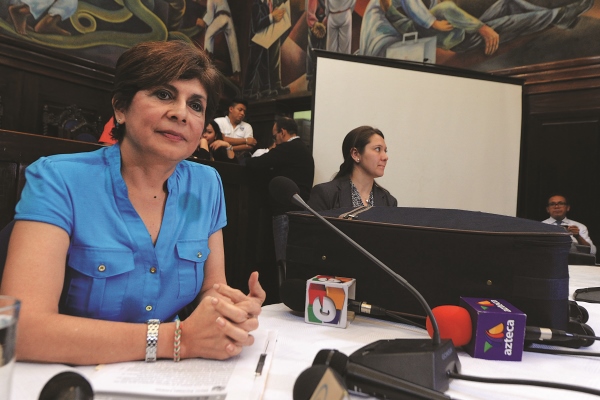 The protests initially scared some used to a more violent era, including Nineth Montenegro (ORLANDO SIERRA/AFP/GETTY)
The protests initially scared some used to a more violent era, including Nineth Montenegro (ORLANDO SIERRA/AFP/GETTY)
But Montenegro, like many others, failed to realize that things had changed. Guatemala has been a democracy, however imperfect, since 1986. The Cold War, and the cover it gave to atrocities across Latin America, ended shortly thereafter. Where there was once only the military, today there is a vibrant civil society and news media. If soldiers or police do get the urge to machine-gun a crowd, they’d better be ready for a thousand smartphones to record it. The story is similar in other countries where dictatorship gave way to democracy in the 1980s and early 1990s, including Peru, Brazil, Paraguay, Chile and others.
“Today’s youth have grown up in a culture of peace and pluralism, and they finally feel they can demand things without fear,” Montenegro said. “We know that now.”
“I think it’s wonderful.”
3. A Formidable Generation of Prosecutors
The April 25 protest eventually dispersed, but a group of people even more dangerous to Guatemala’s corrupt rulers would meet again the following Monday.
And the next day. And the day after that.
They would prove relentless.
The International Commission Against Impunity in Guatemala, or CICIG for its initials in Spanish, was created in 2006. The product of a treaty between the United Nations and the Guatemalan government, CICIG was a group of largely foreign-born prosecutors and investigators. Their mission: to help local authorities identify criminal groups and prosecute them.
This was, of course, an unusual arrangement. CICIG’s critics accused Guatemala of effectively outsourcing its judicial system. But the extra help was needed in the aftermath of the 36-year civil war and the more recent infiltration of the state by drug cartels, said Carlos Castresana, a Spanish lawyer who was CICIG’s first chief.
“When I arrived, we had to find 100 honest police (to work with). Do you know how hard that was?” Castresana told me. “We were always giving them lie detector tests. We had to train them ourselves. We even put them in separate barracks so they couldn’t be corrupted by the others.”
By 2015, such efforts had borne fruit. CICIG was now being run by a Colombian prosecutor, Iván Velásquez, who had made a name battling drug dealers in his home country. Working hand in hand with Aldana, the Guatemalan attorney general, Velásquez began accumulating evidence against a seemingly run-of-the-mill smuggling ring in the customs agency. The two set up a series of phone taps, in which suspects repeatedly referred to someone as “Number Two” or “La Señora.”
“When we first saw that,” Aldana recalled, “and it occurred to us this might be the vice president, I thought , ‘No! I can’t believe it!’”
But, alas.
Shortly thereafter, the case against Baldetti was made public. At this point, any government with a sense of self-preservation might have sought to squelch the case — or terminate CICIG’s charter altogether. President Pérez Molina had, in fact, tried to do just that in early 2015, but reversed himself under intense local and international pressure. Now, in the wake of the April 25 protest, killing off CICIG or the customs investigation had become politically impossible.
CICIG continued to accumulate and present new evidence against Baldetti and other officials. As if on cue, new protests would break out, raising the pressure on public officials even more. “Suddenly, corruption at the highest levels wasn’t just a rumor anymore,” said Pérez, the student protest leader. “They found evidence that was impossible to deny. It would have been impossible without CICIG.”
The feeling was mutual. I asked Velásquez, the head of CICIG, if he thought the investigation would have been allowed to continue without the protesters’ support. “Probably not,” he replied.
“Guatemalan society was ready for this,” Velásquez told me. “It just needed a spark.”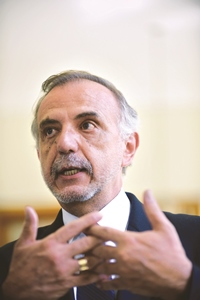 Colombian prosecutor Iván Velásquez (Johan Ordonez/AFP/Getty)
Colombian prosecutor Iván Velásquez (Johan Ordonez/AFP/Getty)
The role of CICIG has been used as “proof” the Guatemalan case was somehow exceptional. No other country has a CICIG, the argument goes — and no other country ever will, given what it accomplished.
That latter part is probably true. But it’s also true that most Latin American countries do not need a CICIG. Prosecutors and judges around the region have made extraordinary progress over the last 30 years. As democracies have matured, judicial systems have gained more independence and technical know-how.
Indeed, prosecutors across Latin America have executed investigations even more complicated and explosive than CICIG’s. Petrobras is another case in which investigators began with a seemingly minor crime — a money launderer in Brazil’s south — and methodically followed the money all the way to the very highest echelons of power. New pro-transparency legislation in Mexico, Brazil and elsewhere has also aided the pursuit of such cases. In these ways and others, what happened in Guatemala wasn’t the exception. It was the rule.
4. A Bigger, More Demanding Middle Class
On May 8, under the weight of increasing evidence, Vice President Baldetti resigned. Yet by that point, it was clear the customs scheme didn’t stop with her. Soon, the evidence pointed to President Pérez Molina himself.
This was the most high-risk phase, and everyone knew it. “If there had been one shot, or one riot, it was over for the protests,” Juan de la Garza, an advertising executive who participated, told me. “The president would have said, ‘Ah, look at these criminals in the street, how can they judge me?’ The middle class would have stopped coming. So we always told people to keep calm, to let the case advance, not to be violent.”
Meanwhile, Pérez Molina insisted on his innocence, and made clear he wouldn’t go without a fight. A former military intelligence officer during the most violent period of Guatemala’s civil war, he knew which buttons to press. By late August, with Congress set to strip him of his legal immunity, Pérez Molina went on national television and called on Guatemala profunda, “deepest Guatemala,” to step forward. He explicitly summoned the rural poor, “this Guatemala that has always been at the center of my attention,” to help defend him.
On the morning of the vote, a crowd of Pérez Molina supporters wielding bats and sticks gathered outside Congress, vowing not to let legislators inside. It briefly looked like 1983 all over again. But no — instead, this would prove to be Guatemala’s shining moment. A bigger group of people now appeared, carrying only flowers. They pleaded with the rabble-rousers to put down their weapons and step aside. Standing arm in arm with the police, they formed a human chain that allowed the legislators to enter the building.
Once inside, Congress voted — unanimously — to strip Pérez Molina of his immunity.
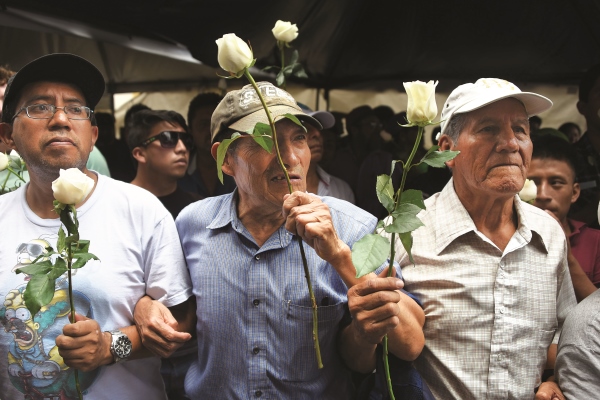 Protesters bearing flowers helped pave the way for Pérez Molina’s resignation. (Johan Ordonez/AFP/Getty)
Protesters bearing flowers helped pave the way for Pérez Molina’s resignation. (Johan Ordonez/AFP/Getty)
This story, too, has played out again and again across Latin America. The region’s middle class swelled by more than 50 million people over the last decade, and it now outnumbers those in poverty for the first time in history. Values have changed. These days, the people with flowers tend to outnumber the people with sticks.
“When this country was poorer, you’d hear more people say, ‘Ah, he steals but he gives us jobs.’ But now people are thinking of more than survival. They want good government, honesty,” Aldana, the attorney general, said. “They will stand up for these rights.”
With his immunity gone, Pérez Molina knew the game was up. To his credit, he now went quietly — resigning and presenting himself to jail. Interestingly, the popular reaction was somewhat subdued. Wer, whose Facebook post helped start it all, briefly joined a group of people celebrating in a park, but then went to work. “I didn’t think it was good to celebrate,” he told me. “This was someone we elected democratically. In the end, it was very bittersweet.”
Indeed, for most people, pride was quickly replaced by the sense the journey was just starting. Before leaving Guatemala, I visited Helen Mack, probably the country’s best-known human rights activist, and a thorn in the side of successive governments since her sister was murdered by the military in 1990. I asked her if she was optimistic about lasting change.
“No,” she said flatly, taking a long drag from a cigarette.
No?
Mack shrugged. “The young people know they’re creating their future. But the politicians, many believe they can change names (at the top) and continue business as usual. If so, we’ll just be back here again soon.”
The younger generation knows that to really change things, they will have to enter government themselves — a difficult task. “It’s easier to put people against something than in favor of something,” admitted Pérez, the student leader. But he said his peers are trying to found new political parties using foreign movements like Podemos, in Spain, as a model.
Castresana, CICIG’s first chief, acknowledges the skepticism, but believes change is irreversible. “A society can’t change unless society itself loses its fear,” he said.
“Well, now it’s the bad guys who are afraid.”
Really.
—
Winter is the editor-in-chief of Americas Quarterly.



